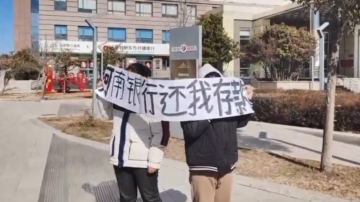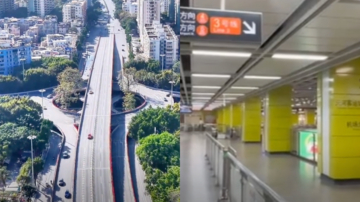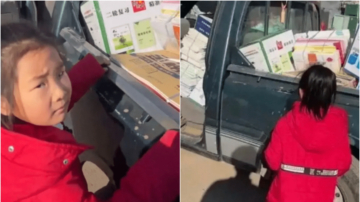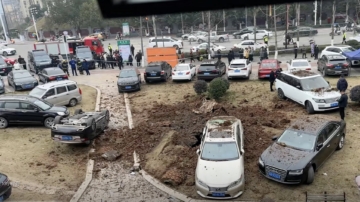【新唐人2013年01月03日讯】2013年的第一天,中国大陆新修订的《刑事诉讼法》、《民事诉讼法》,以及《学位论文作假行为处理办法》等一批法律法规,及部门规章,开始正式实施。而“尊重和保障人权”正式写入修订后的《刑事诉讼法》。可是,中国的律师却认为,大陆的立法机构和司法机构,都在一党专政的控制之下,这些法律在司法不独立的情况下很难实施。而且,法律越多,对公民的控制也就越多。
据大陆媒体报导,这次《刑事诉讼法》修改内容涉及100多处,超过原内容的80%,覆盖了所有诉讼流程:从立案到侦查,再到起诉、辩护、审判、执行,外加证据制度。
中国“东南大学”法学院教授张赞宁认为,新《刑诉法》是司法一个很大的倒退。他说,现在中国任何一个人的权利都不受法律保护,他们可以秘密失踪,这是一个很可怕的事情。
中国“东南大学”法学院教授张赞宁:“我觉得刑事诉讼法,主要对公民的权利(限制)在无限扩大,它可以秘密逮捕一些罪犯,这是一个很大的倒退,甚至不通知家属。这个主要是我们的立法机构和司法机构都是一党专政的结果,权力不受制约,中国人民的权利就没有保障了。”
而北京律师江天勇也指出,那种“被失踪”的条款臭名昭着,而历年所谓的一些进步,在没有司法独立的情况下,很难得到实施。所以他说,法律越多,对公民的控制也就越多。
江天勇还表示,“居民身份证法”实际就是增加对公民的控制。去年5月,江天勇在车站因实名购买车票而被定位,当天他被突然出现的当局人员控制。
北京律师江天勇:“现在把身份证法的情形扩大了,几乎是甚么地方都能够查。还有居民身份证法要求在身份证里面储存更多的信息、指纹,实际就是一种身份的控制,而且越来越多的居民身份证用来控制乘车呀,住宾馆呀,像我们这样的人,他们就会对你进行控制。”
江天勇还表示,法律弄得再多,也不会使中国大陆真正的法治化。因为中共制定的法律,不是在保障公民的各项权利,而是在于增强官方的“维稳能力”。
江天勇:“民事诉讼法里面很关键的公民委托代理人的权利,就受到限制,一个公民委托除了律师以外,委托其他的公民的话,就必须是社区推荐的这种限制,这种限制使得一个人想委托另一个人来做你的代理人的话,实际上就必须经过社区的推荐,那么中国的社区,实际上还是共产党控制的一个组织,它是用来帮助共产党控制民众的。”
此外,司法解释规定,不得对庭审活动进行录音、录像、摄影,或者通过发送邮件、博客、微博客等方式传播庭审情况。但经人民法院许可的新闻记者除外。据最高法院有关负责人解释,这项规定主要针对个别诉讼参与人所谓“直播”庭审情况,试图引发舆论关注、炒作,制造“舆论压力”,干扰法院审判。
日前,《拘留所条例实施办法》也开始发布施行。根据办法,拘留所应当安装并使用监控录像等技术防范设备,对被拘留人进行实时全方位安全监控,监控录像资料至少保存15天。被拘留人在拘留期间死亡、身体受到伤害,可能提起国家赔偿要求的,拘留所应当将相关监控录像资料予以刻录留存。
而北京维权律师唐吉田表示:当局是要通过修法,把对民众的控制做到极致:凡是有利于保护官员的,都会不遗馀力的推行,少得可怜但保护民众的,都会大打折扣。他还说,配合修改后的《身份证法》及新出台的《关于加强网络信息保护的决定》,公民的人身及其他权利,被官方侵犯的概率会更大。
采访/李莲 编辑/周平 后制/君卓
China’s Revised Laws: More Restrictions Over Civilians
On the first day of 2013, revised version of a number
of laws or ordinances start to take effect in China.
These include Criminal Procedure Law, Civil Procedure Law,
and the Method of Disposition of Thesis Fraud.
In the revised Criminal Procedure Law, the wording,
“respect and protect human rights” has been added.
However, Chinese lawyers commented that both,
the legislative and juridical systems are controlled by the one-party dictatorship.
Therefore it is very difficult to apply those laws
without judicial independence.
On the other hand, making more laws would mean
imposing more restrictions over civilians.
According to mainland media, over 100 revisions, applied
to the Criminal Procedure Law, will take effect in 2013.
The revisions involve over 80% of the original law,
and cover the whole litigation process.
These include case registration and investigation,
prosecution, pleading, trial and execution, as well as the law of evidence.
Zhang Zanning, China’s Southeast University’ Law Professor,
thinks the revised Criminal Procedure Law is retrogressive.
Zhang remarked that now the rights of the Chinese
are no longer protected by the law.
Everyone can “legally” disappear,
which is simply horrifying to think of.
Zhang Zanning (Law Professor, Southeast University):
”I think the Criminal Procedure Law is extending the power of public security departments in an unlimited way.
Now they can secretly arrest people,
even without informing their families.
This is a huge step backwards, and it is a result of the fact
that our legislative and juridical system only serve the one-party dictatorship regime.
There is no restriction on its power. Thus there is
no protection of the rights of the Chinese people.”
Beijing lawyer Jiang Tianyong remarked that the provision
to legalize “making anyone disappear” has become notorious among Chinese.
On the other hand, the aspects claimed as improvements
can hardly be applied without judicial independence.
Jiang concluded that making more laws is equivalent
to imposing more restrictions on the civilians.
Jiang Tianyong added that the Law of Citizens’ ID Cards
in fact intensifies the control over the Chinese people.
Last May, Jiang revealed his location
while buying tickets at a train station with his ID card.
On the same day, governmental staff suddenly appeared
and apprehended him.
Jiang Tianyong (Beijing lawyer): ”This time the situations
to apply the Law of Identity Cards have been extended.
You can be inspected almost anywhere.
Plus, more information, such as fingerprints, is required
to be stored on the ID card. This is a real identity control.
The ID card is being requested in more cases,
such as taking a bus or during hotel check-in.
Especially for groups of people like us,
they will control our actions with such means.”
Jiang Tianyong believes that China will not be ruled
by a law, no matter how many more laws are made.
That is because the ruling Chinese Communist Party (CCP)
is making laws to boost its “stability maintenance” rather than to protect civil rights.
Jiang Tianyong: ”In Civil Procedure Law, every citizen has
a very important right to commission authorized agent.
This right is currently restricted in China.
If a Chinese citizen wants to commission any other citizen
who is not a lawyer, the authorized person has to have the recommendation of the local community committee.
So such a restriction compels you to visit
the local community committee.
But in fact China’s community agencies
are also under the control of CCP.
So you see how the whole procedure is just designed
to assist the control over the Chinese people.”
In addition, the judicial interpretation bans
any sound or video recording of court hearings.
It also bans anyone other than authorized journalists
to report on the trial by email, Internet blog or microblog.
An official of the Supreme Court said that such a provision
is directed against litigant participants who make live reports on the progress of court hearings.
The official criticized such behavior as “an attempt to draw
media attention to interfere with the trial by public opinion.”
Recently, “Measures for Implementation of Regulation
on Detention Facilities” also started to take an effect.
The measures require detention facilities to install
protection equipment such as surveillance cameras for real-time monitoring of detainees’ safety.
The new regulation requires such video data
to be kept for at least 15 days.
In cases of detainees’ injury or death, records can be used
from archives to assist in possible compensation’ claims.
Another Beijing lawyer, Tang Jitian, remarked that the CCP
authorities revised the laws to push forward the control over Chinese civilians to extreme.
They spare no efforts to apply any revision
that benefits the officials.
On the other hand, even the very few revisions protecting
civilians’ rights will not be applied in their original form.
Tang pointed out the revised ID Cards’ Law, and the new
decision to intensify Internet information censorship,
stressing that with those two, Chinese citizens’ freedom
and other rights can only be further violated by the CCP.
据大陆媒体报导,这次《刑事诉讼法》修改内容涉及100多处,超过原内容的80%,覆盖了所有诉讼流程:从立案到侦查,再到起诉、辩护、审判、执行,外加证据制度。
中国“东南大学”法学院教授张赞宁认为,新《刑诉法》是司法一个很大的倒退。他说,现在中国任何一个人的权利都不受法律保护,他们可以秘密失踪,这是一个很可怕的事情。
中国“东南大学”法学院教授张赞宁:“我觉得刑事诉讼法,主要对公民的权利(限制)在无限扩大,它可以秘密逮捕一些罪犯,这是一个很大的倒退,甚至不通知家属。这个主要是我们的立法机构和司法机构都是一党专政的结果,权力不受制约,中国人民的权利就没有保障了。”
而北京律师江天勇也指出,那种“被失踪”的条款臭名昭着,而历年所谓的一些进步,在没有司法独立的情况下,很难得到实施。所以他说,法律越多,对公民的控制也就越多。
江天勇还表示,“居民身份证法”实际就是增加对公民的控制。去年5月,江天勇在车站因实名购买车票而被定位,当天他被突然出现的当局人员控制。
北京律师江天勇:“现在把身份证法的情形扩大了,几乎是甚么地方都能够查。还有居民身份证法要求在身份证里面储存更多的信息、指纹,实际就是一种身份的控制,而且越来越多的居民身份证用来控制乘车呀,住宾馆呀,像我们这样的人,他们就会对你进行控制。”
江天勇还表示,法律弄得再多,也不会使中国大陆真正的法治化。因为中共制定的法律,不是在保障公民的各项权利,而是在于增强官方的“维稳能力”。
江天勇:“民事诉讼法里面很关键的公民委托代理人的权利,就受到限制,一个公民委托除了律师以外,委托其他的公民的话,就必须是社区推荐的这种限制,这种限制使得一个人想委托另一个人来做你的代理人的话,实际上就必须经过社区的推荐,那么中国的社区,实际上还是共产党控制的一个组织,它是用来帮助共产党控制民众的。”
此外,司法解释规定,不得对庭审活动进行录音、录像、摄影,或者通过发送邮件、博客、微博客等方式传播庭审情况。但经人民法院许可的新闻记者除外。据最高法院有关负责人解释,这项规定主要针对个别诉讼参与人所谓“直播”庭审情况,试图引发舆论关注、炒作,制造“舆论压力”,干扰法院审判。
日前,《拘留所条例实施办法》也开始发布施行。根据办法,拘留所应当安装并使用监控录像等技术防范设备,对被拘留人进行实时全方位安全监控,监控录像资料至少保存15天。被拘留人在拘留期间死亡、身体受到伤害,可能提起国家赔偿要求的,拘留所应当将相关监控录像资料予以刻录留存。
而北京维权律师唐吉田表示:当局是要通过修法,把对民众的控制做到极致:凡是有利于保护官员的,都会不遗馀力的推行,少得可怜但保护民众的,都会大打折扣。他还说,配合修改后的《身份证法》及新出台的《关于加强网络信息保护的决定》,公民的人身及其他权利,被官方侵犯的概率会更大。
采访/李莲 编辑/周平 后制/君卓
China’s Revised Laws: More Restrictions Over Civilians
On the first day of 2013, revised version of a number
of laws or ordinances start to take effect in China.
These include Criminal Procedure Law, Civil Procedure Law,
and the Method of Disposition of Thesis Fraud.
In the revised Criminal Procedure Law, the wording,
“respect and protect human rights” has been added.
However, Chinese lawyers commented that both,
the legislative and juridical systems are controlled by the one-party dictatorship.
Therefore it is very difficult to apply those laws
without judicial independence.
On the other hand, making more laws would mean
imposing more restrictions over civilians.
According to mainland media, over 100 revisions, applied
to the Criminal Procedure Law, will take effect in 2013.
The revisions involve over 80% of the original law,
and cover the whole litigation process.
These include case registration and investigation,
prosecution, pleading, trial and execution, as well as the law of evidence.
Zhang Zanning, China’s Southeast University’ Law Professor,
thinks the revised Criminal Procedure Law is retrogressive.
Zhang remarked that now the rights of the Chinese
are no longer protected by the law.
Everyone can “legally” disappear,
which is simply horrifying to think of.
Zhang Zanning (Law Professor, Southeast University):
”I think the Criminal Procedure Law is extending the power of public security departments in an unlimited way.
Now they can secretly arrest people,
even without informing their families.
This is a huge step backwards, and it is a result of the fact
that our legislative and juridical system only serve the one-party dictatorship regime.
There is no restriction on its power. Thus there is
no protection of the rights of the Chinese people.”
Beijing lawyer Jiang Tianyong remarked that the provision
to legalize “making anyone disappear” has become notorious among Chinese.
On the other hand, the aspects claimed as improvements
can hardly be applied without judicial independence.
Jiang concluded that making more laws is equivalent
to imposing more restrictions on the civilians.
Jiang Tianyong added that the Law of Citizens’ ID Cards
in fact intensifies the control over the Chinese people.
Last May, Jiang revealed his location
while buying tickets at a train station with his ID card.
On the same day, governmental staff suddenly appeared
and apprehended him.
Jiang Tianyong (Beijing lawyer): ”This time the situations
to apply the Law of Identity Cards have been extended.
You can be inspected almost anywhere.
Plus, more information, such as fingerprints, is required
to be stored on the ID card. This is a real identity control.
The ID card is being requested in more cases,
such as taking a bus or during hotel check-in.
Especially for groups of people like us,
they will control our actions with such means.”
Jiang Tianyong believes that China will not be ruled
by a law, no matter how many more laws are made.
That is because the ruling Chinese Communist Party (CCP)
is making laws to boost its “stability maintenance” rather than to protect civil rights.
Jiang Tianyong: ”In Civil Procedure Law, every citizen has
a very important right to commission authorized agent.
This right is currently restricted in China.
If a Chinese citizen wants to commission any other citizen
who is not a lawyer, the authorized person has to have the recommendation of the local community committee.
So such a restriction compels you to visit
the local community committee.
But in fact China’s community agencies
are also under the control of CCP.
So you see how the whole procedure is just designed
to assist the control over the Chinese people.”
In addition, the judicial interpretation bans
any sound or video recording of court hearings.
It also bans anyone other than authorized journalists
to report on the trial by email, Internet blog or microblog.
An official of the Supreme Court said that such a provision
is directed against litigant participants who make live reports on the progress of court hearings.
The official criticized such behavior as “an attempt to draw
media attention to interfere with the trial by public opinion.”
Recently, “Measures for Implementation of Regulation
on Detention Facilities” also started to take an effect.
The measures require detention facilities to install
protection equipment such as surveillance cameras for real-time monitoring of detainees’ safety.
The new regulation requires such video data
to be kept for at least 15 days.
In cases of detainees’ injury or death, records can be used
from archives to assist in possible compensation’ claims.
Another Beijing lawyer, Tang Jitian, remarked that the CCP
authorities revised the laws to push forward the control over Chinese civilians to extreme.
They spare no efforts to apply any revision
that benefits the officials.
On the other hand, even the very few revisions protecting
civilians’ rights will not be applied in their original form.
Tang pointed out the revised ID Cards’ Law, and the new
decision to intensify Internet information censorship,
stressing that with those two, Chinese citizens’ freedom
and other rights can only be further violated by the CCP.








